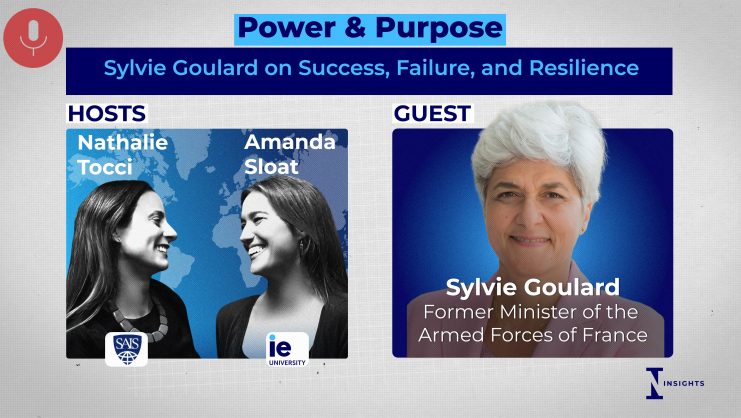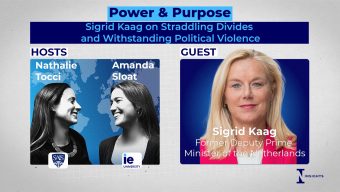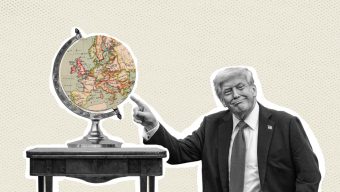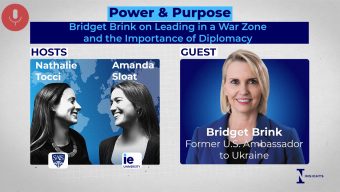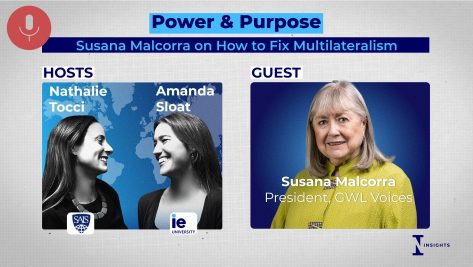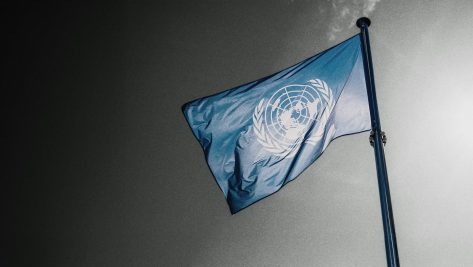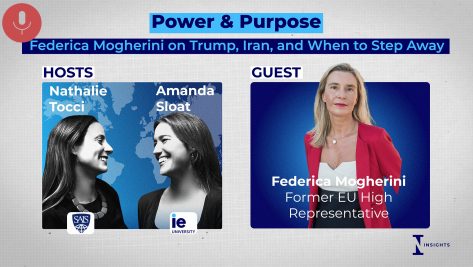Transatlantic Relations: Talking Trends
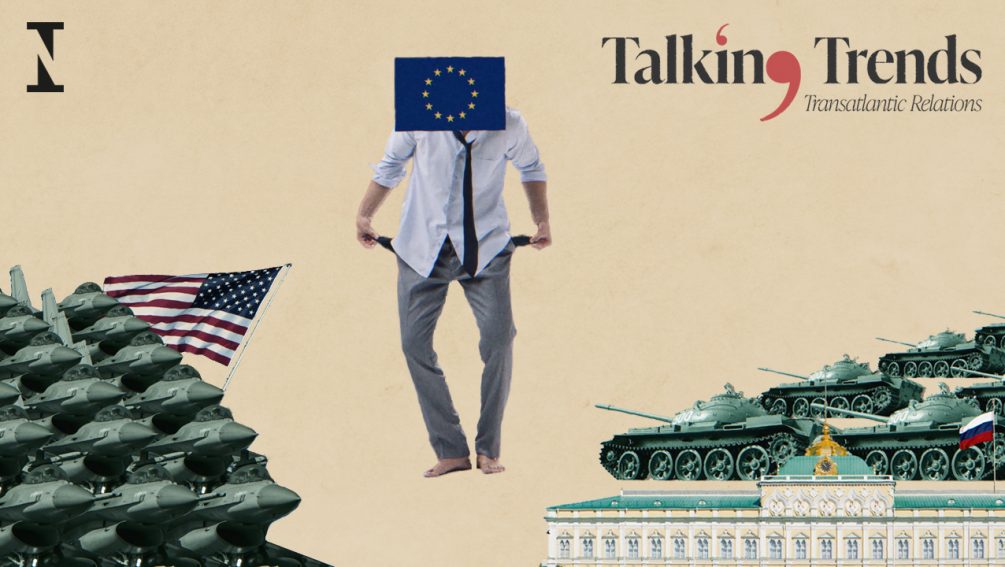
The relationship between the US and Europe has rarely been as scrutinized as it is right now. Heather Conley, President of the German Marshall Fund, and Manuel Muñiz discuss the wars in Ukraine and Gaza, the future of NATO, and the evolving situation in the Indo-Pacific.
Transcription
Manuel Muñiz: Heather, it’s wonderful to have you here. And thank you so much for coming to Spain.
Heather Conley: Manuel, it is great to be here. A privilege to be with you. Thank you.
MM: I want to begin talking about Ukraine. We’ll talk about Russia writ large, but in particular Ukraine. So how do you see things evolving on the ground in Ukraine? How do you see the future that the conflict evolving and moving forward in this very pivotal year as well for events on the ground?
HC: Manuel, what a consequential year 2024 is going to be for Ukraine. We will mark the beginning of the third year of the full-scale invasion, a decade of war, of Russia’s illegal occupation of Crimea and occupation in Donbass. So this is really a test of not only Ukrainian resolve. It is our resolve. It’s Europe’s resolve, the United States’ resolve, North America’s resolve, because if Ukraine is unsuccessful, we are going to face a larger challenge with Russia.
Russia will continue. They they will not stop. The Kremlin needs confrontation with the West for its own political survival. So we really now have to start talking about what’s at stake if Ukraine is not successful for our own security and our own prosperity among all NATO countries. So this is why support is absolutely critical. And unfortunately, politics in both the United States and in Europe are very challenging for this continued support.
Ukraine has to be victorious. At some future point, it must restore its territory to its 1991 borders. That is our goal and we have to have the endurance to do that.
MM: Do you foresee in the next 12 months any major issue when it comes to the unity of the support both in Europe or the United States? I mean, are there major roadblocks? Is there anything that concerns you? And then beyond the next 12 months, is there anything in the elections? I think in Europe, but fundamentally in the U.S. that worries you, for the support for Ukraine moving forward?
HC: So right now, winning the war, Ukraine has to have the military equipment to be able to restore its territorial integrity. That’s going to be critical. And look, we have to prepare ourselves for yet another Russian counteroffensive. They see the vulnerability. So winning the war, continuing to have Ukraine be successful on the battlefield, winning the peace, that’s Ukraine’s economic recovery and reconstruction eventually.
And we have to start planning for that in great earnest. It is not clear whether the U.S. will continue to support Ukraine. We’re very concerned about that. That’s why we have to work so much across America to help American citizens understand what’s at stake and why it’s important for their prosperity, their security. The international system is at stake in Ukraine and what we need to do to make sure that the West prevails.
MM: I want to pivot to NATO, but I want to ask you something about Russia, because you worked on Russia, you know Russia well. How does this look on the Russian end? I mean, is Russian support and capacity to sustain the effort, is it unlimited? Is it under less constraints than the ones you see in Europe and the United States?
Because it’s a bit of a black box. And I think it’s hard for folks to see beyond the headlines. And we tend to think that, you know, Russia is a much more solid bloc then sometimes it is and it has fragilities within it. But how does this look on the Russian end?
HC: So I think we have to understand that the Russian government is now in a wartime economy. They the Kremlin will not lose. They are in it for as long as it takes, which is, of course, NATO’s slogan of support for Ukraine. So what President Putin has done is everything is being given to this war effort and we have to have that same determination on our end to say, no, this cannot stand.
We cannot have a larger power, continue to invade its neighbors. 2008 in Georgia, 2014 and again in 2022, in Ukraine, forces in Moldova that the Moldovan government has asked Russian forces to leave, they will not leave. If we allow this to stand, we are accepting a new international system where larger powers can influence and directly invade their neighbors.
And of course we have the Indo-Pacific example with China asserting itself in the inevitable reunification of Taiwan. So this is a larger problem. And so President Zelensky of Ukraine has been absolutely right in saying this is not just about Ukraine. This is about the future of the international system, which is why respect for international law is so important here.
MM: Yeah, absolutely. And I mean, this is part of the European experience as well.
We’ve had a long history of a continent where these values, these norms were not respected. And it led us to a state of almost constant war. And I’m not sure we’ve done a very good job of explaining this to the rest of the world, that these are very important principles and that they guarantee peace.
I mean, the territorial integrity of countries and their sovereignty. These are very important principles if you don’t want to fall into a situation of almost permanent conflict. I want to pivot to the NATO question because you’ve also worked on NATO, of course, very extensively. How do you see the future of the alliance? And of course, there’s this constant question of the US elections.
Where do you see it moving forward? Clearly now, Finland and Sweden coming in strengthens the alliance. Much more exposed, of course, in the east. We’ve now inherited very large borders that we need to protect as an alliance, more forward deployment in the eastern part of the alliance. But where do you see the alliance moving forward?
HC: So as we get ready to celebrate the 75th anniversary of NATO’s and you think about 75 years ago, there were 12 countries. Now, absolutely, we hope Sweden’s entrance will be very quickly. In Washington, in July, we’re going to celebrate an alliance of 32 and a border that goes from the Arctic to the Mediterranean. This is a source of great strength.
And I think putting aside the politics in the United States, NATO has drawn up regional defense plans for the first time since the end of the Cold War. We have members focusing on increasing their security and defense and understanding that warfare crosses so many domains. There’s, you know, information space that warfare, the economic domain, space, cyber.
This is, again, tragically Manuel we can’t say that “never again” because we see Europe, the continent is at war again. But I think we can clearly say “never alone”. And I think this has been the powerful message for Finland and Sweden to transform their own status of neutrality into joining an alliance that’s extremely powerful. But you’re absolutely right. Many Americans are questioning and have been questioning for some time the value of allies.
They see the costs and what they believe as an unfair sharing of those costs, that the United States has the preponderance of the weight of military strength and security. We see that happening in the Red Sea right now. We see that happening in the Indo-Pacific. And so they understand costs. I think where we have fallen short in the United States, we have to also talk about the benefits of having 31 allies standing shoulder to shoulder with us.
And of course, the first time NATO has ever invoked Article 5, the attack against one, an attack against all, was after 9-11. And we need to remind the American people that we received benefits from this great alliance system. But there are costs in the investment in that security alliance.
MM: Quick question and then we move to the final bit, which I want to ask you about the Indo-Pacific, which you raised, and China and Taiwan. But there were constant rumors during the Trump administration of Trump sort of thinking about leaving NATO. There was just a big reporting recently on Trump.
HC: Yes, Thierry Breton shared with us that insight yes.
MM: Thierry Breton shared this moment of Trump saying that the U.S. would not abide by Article 5 commitments. Is this a real potential challenge that Europeans should keep in mind, the US either leaving or behaving in a way that renders the alliance ineffective in its fundamental mandate of continental defense of Europe?
HC: If you remember the haunting words of then Secretary of Defense Robert Gates, I think it was in 2011 and he really warned that if Europe continues to not spend sufficiently on its security defense, that this would cause a real challenge for the United States and the American people’s continued support. I think we’ve seen again, while Donald Trump has taken this to the most extreme level of questioning whether the United States would remain in an alliance that it helped create for its own security and prosperity, that this has been over successive Republican and Democratic administrations warning that American support would continue to reduce.
It was Barack Obama who said that Europeans were free riding. Again, this has been a progression, that it’s been flashing a danger sign to us, and I think we haven’t taken it as as seriously as we can. Look, Article 5 is about the credibility and trust that our allies will be there when we need them. It’s not whether we invoke it or not invoke it.
It’s that credibility and it’s the assurance that it will be there. And the former president shook that very profoundly during his time in office. But we’ve seen a counter reaction. We’ve seen in the United States public opinion about NATO actually increasing during President Trump’s administration. Because, you know, when you start shaking the tenets of something that’s very valuable to the United States, you do the exact opposite.
You create that desire to maintain it. Just recently, Congress passed a bill that it will require an act of Congress for the United States to withdraw from NATO. We have to do a much better job of talking to the American people about the benefits.
MM: Let me ask you a final question. It’s a big topic, but of course, it’s about the rise of China, how this is changing the structure of power globally, the China-U.S. relationship. But it’s on the transatlantic take on this. What role do you see for the transatlantic relationship in the Indo-Pacific, if any? I mean, is it limited to the trade and economic piece, sort of building a belt of economic entanglement with China that allows us to influence the way China behaves?
Is it about expanding security commitments on the part of the Europeans to the Indo-Pacific? Some of them have done this individually, not as an alliance, of course, but how does that look? And would further European commitment in the region elevate the importance of Europeans for Americans? Just how does this change in power, in the rise of the Indo-Pacific, play into the transatlantic relationship?
HC: It’s such an important question, thank you. I come back down to the reason that the transatlantic approach to the Indo-Pacific is so important is it’s about values and how we want the future of the international system to look like. Do we want it to be about protection of privacy or do we want it about a surveillance state?
Do we want it to be about larger powers that take regional hegemony and dominate their neighbors? Or do we want countries to choose their alliances, choose their economic sovereignty? What world do we want? That’s what’s so important. And that’s why the Europeans are so important to getting this policy right towards the Indo-Pacific. Yes, the United States has a security architecture in the Indo-Pacific that Europeans don’t.
Bilateral defense treaties with Japan, with Korea, the Philippines, Australia. That’s very different. But Europe also relies on America’s military strength in the Indo-Pacific to keep those sea lanes free and open. So we are all tied to this. And so we have to work together. U.S. policy in the Indo-Pacific will not be as strong and effective unless our allies stand shoulder to shoulder with us.
And we know these are difficult decisions about our economic future, but we have to take them together as I said, never alone, always together. And we have to to work very hard to make sure that Europe and the United States, we have different approaches to the region that we stay shoulder to shoulder, and then we’ll get it right.
MM: Well, that’s a wonderful message to end on. Heather, thank you so much again for being here and for sharing with us your analysis, your thoughts on the state of the transatlantic relationship in this very, very important year.
HC: Manuel thank you. The great thing about traveling within the transatlantic community, you always feel at home. Thank you.



